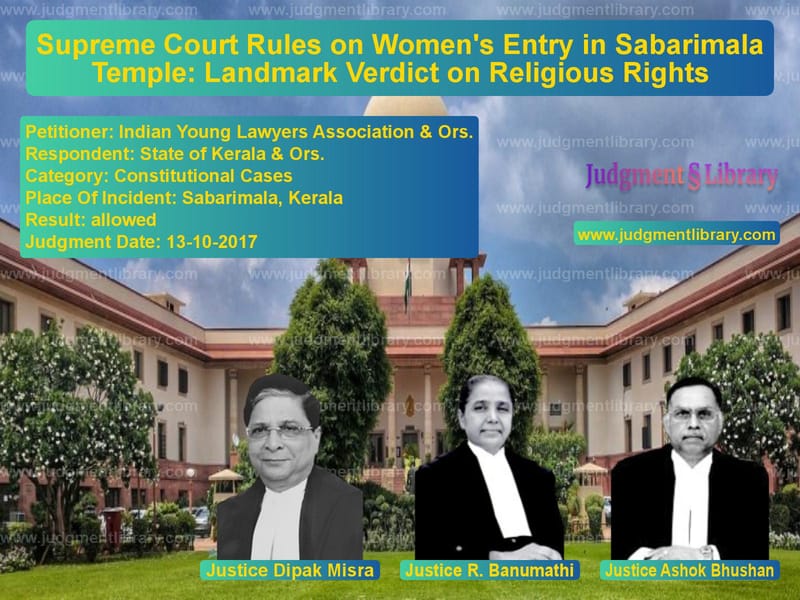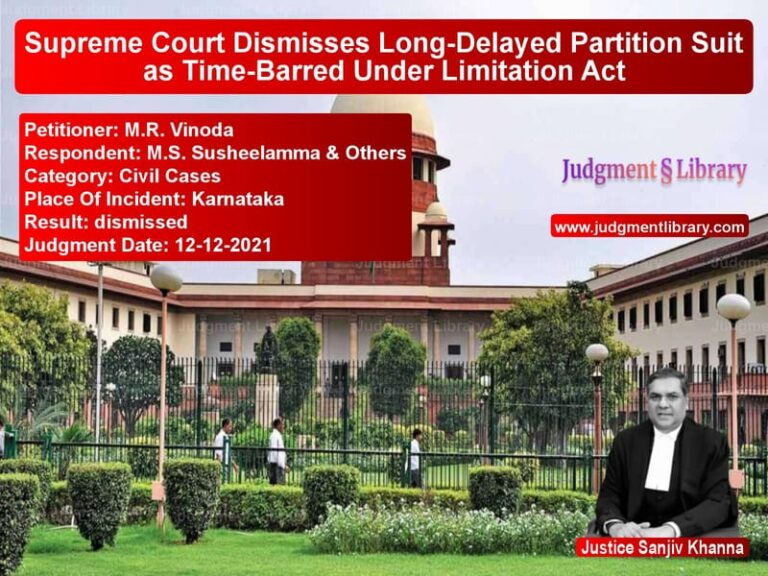Supreme Court Rules on Women’s Entry in Sabarimala Temple: Landmark Verdict on Religious Rights
The Supreme Court of India recently delivered a landmark judgment in the case of Indian Young Lawyers Association & Ors. vs. State of Kerala & Ors., addressing the controversial issue of women’s entry into the Sabarimala Temple. The case challenged the temple’s traditional practice of barring women aged between 10 and 50 from entering the temple, citing religious customs and beliefs.
The core legal issue before the Court was whether the restriction on the entry of women into the temple was unconstitutional and violated the fundamental rights guaranteed under Articles 14, 15, 17, 25, and 26 of the Indian Constitution. The petitioners argued that the ban was discriminatory and violated gender equality, while the respondents contended that it was an essential religious practice.
Background of the Case
The petitioners approached the Supreme Court under Article 32 of the Constitution, seeking a directive to allow women of all ages to enter and worship at the Sabarimala Temple. They challenged Rule 3(b) of the Kerala Hindu Places of Public Worship (Authorization of Entry) Rules, 1965, which prohibited women of a specific age group from entering the temple.
The Kerala High Court had earlier upheld the restriction, ruling that the custom was deeply rooted in religious practice and necessary to maintain the sanctity of the deity, Lord Ayyappa, who is believed to be a ‘Naisthik Brahmachari’ (eternal celibate). The case was later brought before the Supreme Court for reconsideration.
Arguments of the Petitioners
The petitioners contended that:
- The restriction violated Article 14 (Right to Equality) and Article 15 (Prohibition of Discrimination) of the Constitution.
- Religious customs that discriminate against women based on their biological characteristics could not be considered essential religious practices.
- The restriction also violated Article 17, which abolishes untouchability in any form, arguing that menstruating women were being treated as impure.
- Article 25 guarantees the right to practice religion freely, and denying women entry to the temple interfered with their right to worship.
The petitioners argued, “Religious beliefs cannot override fundamental rights, and customs that perpetuate discrimination should not be upheld in a modern, democratic society.”
Arguments of the Respondents
The respondents, including the Travancore Devaswom Board, the Kerala government, and temple authorities, argued:
- The restriction was an essential religious practice protected under Article 26, which grants religious denominations the right to manage their own religious affairs.
- The deity, Lord Ayyappa, is a celibate deity, and allowing women of menstruating age would disturb the temple’s religious sanctity.
- The restriction was not discriminatory but based on religious traditions that have existed for centuries.
- Temple entry regulations are within the rights of religious denominations and should not be interfered with by the judiciary.
The respondents asserted, “Religious customs should be respected and preserved, as they are integral to faith and tradition.”
Supreme Court’s Key Findings
After extensive deliberation, the Supreme Court ruled in favor of the petitioners, striking down the restriction on women’s entry into the Sabarimala Temple. The key observations included:
“The practice of excluding women on the basis of biological characteristics is unconstitutional and violative of fundamental rights.”
The Court emphasized:
- Religious customs cannot supersede constitutional rights.
- The restriction was based on gender and amounted to discrimination, violating Articles 14 and 15.
- Women’s right to worship is an integral part of their religious freedom under Article 25.
- The exclusion of women constituted a form of social exclusion akin to untouchability, violating Article 17.
Final Judgment
The Supreme Court ruled:
- The restriction on women’s entry was unconstitutional and must be lifted.
- Rule 3(b) of the Kerala Hindu Places of Public Worship (Authorization of Entry) Rules, 1965, was declared void.
- Women of all ages have the right to enter and worship at the Sabarimala Temple.
- The Kerala government and the Travancore Devaswom Board must ensure compliance with the ruling.
Key Takeaways from the Judgment
This ruling sets a significant precedent in constitutional law, reinforcing the principles of gender equality and religious freedom. Key takeaways include:
- Fundamental Rights Over Religious Practices: Religious customs cannot override the fundamental rights of individuals.
- Gender Equality in Worship: Women cannot be barred from entering places of worship based on biological differences.
- Judicial Oversight on Religious Matters: Courts can intervene when religious practices violate constitutional principles.
- Abolition of Discriminatory Customs: Customs that discriminate on gender grounds cannot be upheld in a modern constitutional democracy.
Impact of the Judgment
The ruling has far-reaching implications for religious and social practices in India:
- It reinforces the principle that fundamental rights cannot be curtailed by religious customs.
- It strengthens legal protections for women’s rights in religious institutions.
- It sets a precedent for future cases involving religious discrimination.
- It promotes inclusivity and gender equality in religious practices.
Conclusion
The Supreme Court’s decision in Indian Young Lawyers Association & Ors. vs. State of Kerala & Ors. is a landmark ruling that upholds gender equality and reaffirms the supremacy of constitutional rights over religious customs. By allowing women of all ages to enter the Sabarimala Temple, the Court has reinforced the fundamental principles of justice, equality, and religious freedom. This judgment serves as a crucial precedent for ensuring that religious practices do not perpetuate discrimination or violate constitutional rights.
Don’t miss out on the full details! Download the complete judgment in PDF format below and gain valuable insights instantly!
Download Judgment: Indian Young Lawyers vs State of Kerala & Or Supreme Court of India Judgment Dated 13-10-2017.pdf
Direct Downlaod Judgment: Direct downlaod this Judgment
See all petitions in Fundamental Rights
See all petitions in Public Interest Litigation
See all petitions in Constitution Interpretation
See all petitions in Judgment by Dipak Misra
See all petitions in Judgment by R. Banumathi
See all petitions in Judgment by Ashok Bhushan
See all petitions in allowed
See all petitions in supreme court of India judgments October 2017
See all petitions in 2017 judgments
See all posts in Constitutional Cases Category
See all allowed petitions in Constitutional Cases Category
See all Dismissed petitions in Constitutional Cases Category
See all partially allowed petitions in Constitutional Cases Category







